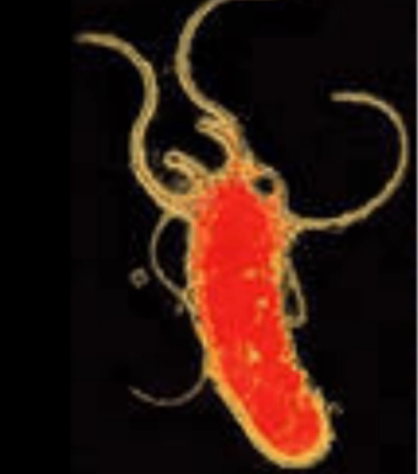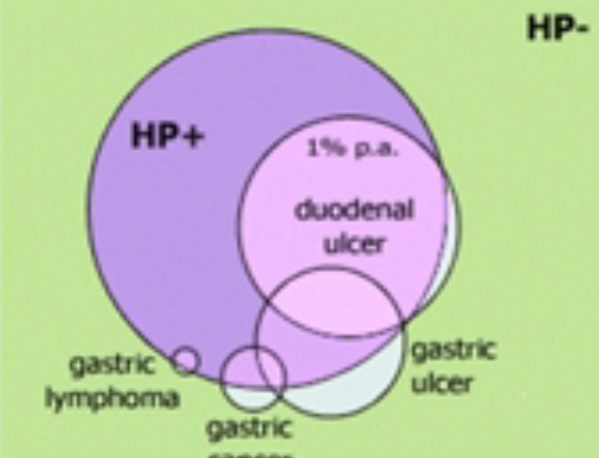Helicobacter pylori or H. pylori is a type of bacterium that causes infection of the stomach, generally during childhood. Helicobacter pylori infection is often the cause of peptic ulcers. The bacteria affects almost half the global population.
Most patients do not elicit any adverse effects of the bacterial infection, and hence are usually unaware about its presence.The reason for lack of signs and symptoms is not known. It is however believed that some patients may be born with increased immunity to the adverse effects of the bacteria.
Individuals who experience symptoms of peptic ulcers must consult a doctor to test for presence of Helicobacter pylori and subsequent antibiotic treatment.
Symptoms of Helicobacter pylori infection
- A majority of individuals infected by Helicobacter pylori do not experience any symptoms. Minor infection may result in sporadic gastritis that causes bloating, vomiting, mild belching, nausea, and abdominal distress. In most cases, the symptoms disappear on their own.
Severe infection by Helicobacter pylori may result in duodenal and stomach ulcers leading to the following signs and symptoms:
- Vomiting and nausea. Occasionally, the vomit may have a coffee-ground appearance or contain blood
- Discomfort or pain in the abdomen that is usually constant and continuous.
- Satiety or feeling of fullness even after eating small quantities of food.
- Chronic lack of appetite
- Presence of bleeding ulcers may cause tar-like, black, or bloody stools.
- Persistent bleeding may result in low RBC count
- Fatigue
- Swallowing difficulties
It is important for patients who experience tarry stools along with fatigue to seek emergency medical care.
Infection with Helicobacter pylori bacteria can result in the below listed health complications:
- The protective lining of the small intestine and stomach can get damaged due to Helicobacter pylori infection. The stomach acid can then act on such vulnerable parts and form an open sore or ulcers.
- Helicobacter pylori infection also greatly increases the risk to developing serious diseases, such as some forms of stomach cancer.
- Helicobacter pylori infection can also lead to inflammation and irritation of the stomach lining. This can then result in development of gastritis.
Causes of Helicobacter pylori infection
Helicobacter pylori infection is a contagious condition. The bacteria can transfer from one individual to another via direct contact with infected vomit, saliva, or fecal materials. The bacteria can also be transmitted via contaminated water or food. In most cases, the infection is acquired during childhood.
It is however important to note that even though the bacteria can pass from one person to another, its spread may not necessarily result in serious signs and symptoms in the newly infected person. Most individuals get infected with Helicobacter pylori bacteria as children. In rare cases, one may contract the bacteria during adulthood.
Some of the risk factors that can increase the vulnerability to contracting Helicobacter pylori infection are listed below:
- Living in homes and neighborhoods that do not have a dependable supply of hot water. When there is consistent supply of hot water, people can engage in activities that can help them keep the living conditions clean and tidy, thereby reducing the risk to Helicobacter pylori infection.
- Residing in crowded localities and rooms. People who live with many other residents in a home are increasingly susceptible to Helicobacter pylori infection.
- Living with a patient with Helicobacter pylori infection. People who are residing with infected individuals are more likely to contract the bacteria.
- Residing in a developing nation. Developing nations are usually beset with living conditions that are often unsanitary and overcrowded. People living in such countries are therefore at greater risk to becoming infected with Helicobacter pylori.
Diagnosis and tests for Helicobacter pylori infection
The doctor will conduct a variety of tests and diagnostic procedures to detect the presence of Helicobacter pylori infection. Some of the major diagnostic tests are listed below:
- A blood test: A blood sample is collected by the nurse, mostly by pricking a finger. This blood sample is then analyzed in a laboratory for presence of a current or past case of Helicobacter pylori infection.
- A stool test: Your stool sample is examined in a lab for signs of antigens or foreign proteins. This test is known as a stool antigen test. The foreign proteins are related to Helicobacter pylori infection of the stool.
- A breath test: During this test, patients need to intake liquids, a pill, or pudding which has radioactive carbon molecules. The swallowed solution reacts in the stomach of people with Helicobacter pylori infection and gets broken down, thereby releasing radioactive carbon in the process.This carbon is then absorbed by the body and expelled during the process of exhalation. Patients need to breathe out into a bag. The physician will then employ a special device to verify the presence of radioactive carbon in the exhaled breath.
- A scope test: An endoscopy exam involves threading of a long flexible tube down the throat, through the esophagus, and finally into the stomach and duodenum. This tube is fitted with a small camera. The doctor will use this device to check for presence of abnormalities in the upper part of the digestive tract. He/she will also take out tissue samples for biopsy. Later, these tissue samples are checked in a lab for Helicobacter pylori infection.
Treatment of Helicobacter pylori infection
Helicobacter pylori infections are mostly treated with two kinds of antibiotics at the same time. This is to prevent the development of resistance by the bacteria to one type of antibiotic.
The doctor will also suggest acid suppression medications to aid the healing process of the stomach lining.
Patients will also be asked to undergo tests for Helicobacter pylori infection, many weeks after the antibiotic therapy. If these tests reveal that the initial treatment did not destroy the bacterial infection, then the doctor will put affected individuals under another course of treatment that includes a combination of different antibiotic drugs.
Doctors will often test even healthy people for presence of Helicobacter pylori infections in those regions of the world where the bacterial infection and resultant health complications are common. People who have a family history of stomach cancers or ulcers can also visit a doctor for verifying the presence of Helicobacter pylori infection, even if they do not experience any signs or symptoms.
Helicobacter pylori pictures


